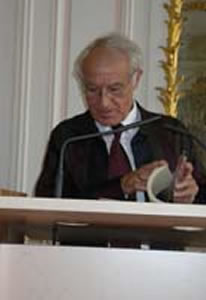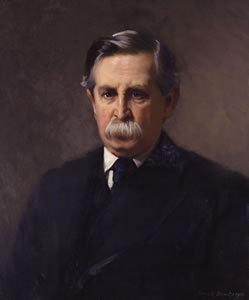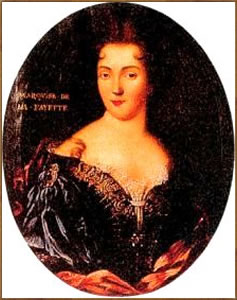De Franse schrijver en filosoof Charles Louis de Secondat, baron de La Brède et de Montesquieu werd geboren op 18 januari 1689 op het kasteel La Brède bij Bordeaux. Zie ook mijn blog van 18 januari 2007 en ook mijn blog van 18 januari 2009.
Uit: Lettres Persanes
“LETTRE III. ZACHI A USBEK.
A Tauris.
Nous avons ordonné au chef des eunuques de nous mener à la campagne; il te dira qu’aucun accident ne nous est arrivé. Quand il fallut traverser la rivière et quitter nos litières, nous nous mîmes, selon la coutume, dans des boîtes: deux esclaves nous portèrent sur leurs épaules, et nous échappâmes à tous les regards.
Comment aurais-je pu vivre, cher Usbek, dans ton sérail d’Ispahan; dans ces lieux qui, me rappelant sans cesse mes plaisirs passés, irritaient tous les jours mes désirs avec une nouvelle violence? J’errais d’appartements en appartements, te cherchant toujours et ne te trouvant jamais, mais rencontrant partout un cruel souvenir de ma félicité passée. Tantôt je me voyais en ce lieu où, pour la première fois de ma vie, je te reçus dans mes bras; tantôt dans celui où tu décidas cette fameuse querelle entre tes femmes. Chacune de nous se prétendait supérieure aux autres en beauté. Nous nous présentâmes devant toi, après avoir épuisé tout ce que l’imagination peut fournir de parures et d’ornements: tu vis avec plaisir les miracles de notre art; tu admiras jusqu’où nous avait emportées l’ardeur de te plaire. Mais tu fis bientôt céder ces charmes empruntés à des grâces plus naturelles, tu détruisis tout notre ouvrage: il fallut nous dépouiller de ces ornements qui t’étaient devenus incommodes; il fallut paraître à ta vue dans la simplicité de la nature. Je comptai pour rien la pudeur, je ne pensai qu’à ma gloire. Heureux Usbek, que de charmes furent étalés à tes yeux! Nous te vîmes longtemps errer d’enchantements en enchantements: ton âme incertaine demeura longtemps sans se fixer, chaque grâce nouvelle te demandait un tribut, nous fûmes en un moment toutes couvertes de tes baisers; tu portas tes regards dans les lieux les plus secrets; tu nous fis passer en un instant dans mille situations différentes; toujours de nouveaux commandements, et une obéissance nouvelle. Je te l’avoue, Usbek, une passion encore plus vive que l’ambition me fit souhaiter de te plaire. Je me vis insensiblement devenir la maîtresse de ton coeur; tu me pris, tu me quittas, tu revins à moi, et je sus te retenir: le triomphe fut tout pour moi, et le désespoir pour mes rivales. Il nous sembla que nous fussions seuls dans le monde: tout ce qui nous entourait ne fut plus digne de nous occuper. Plût au ciel que mes rivales eussent eu le courage de rester témoins de toutes les marques d’amour que je reçus de toi! Si elles avaient bien vu mes transports, elles auraient senti la différence qu’il y a de mon amour au leur; elles auraient vu que, si elles pouvaient disputer avec moi de mes charmes, elles ne pouvaient disputer de sensibilité…
Mais où suis-je? Où m’emmène ce vain récit? C’est un malheur de n’être point aimée; mais c’est un affront de ne l’être plus. Tu nous quittes, Usbek, pour aller errer dans des climats barbares. Quoi! Tu comptes pour rien l’avantage d’être aimé? Hélas! Tu ne sais pas même ce que tu perds! Je pousse des soupirs qui ne sont point entendus; mes larmes coulent, et tu n’en jouis pas; il semble que l’amour respire dans le sérail, et ton insensibilité t’en éloigne sans cesse! Ah! mon cher Usbek, si tu savais être heureux!
Du sérail de Fatmé, le 21 de la lune de Maharram, 1711.”

Montesquieu (18 januari 1689 – 10 februari 1755)
Beeld van Clodion uit 1783, Louvre, Parijs.
De Engelse dichter en letterkundige Jon Stallworthy werd geboren op 18 januari 1935 in Londen. Zie ook mijn blog van 18 januari 2009.
At Half Past Three in the Afternoon
On one side of the world
I was watching the waterfall
shake itself out, a scroll unfurled
against a grey slate wall,
when on the other side
it would be half past nine, and you
in bed – when on the other side
the night was falling further than I knew.
And watching the water
fall from that hole in the sky
to be combed into foam, I caught
a glimpse in the pool’s dark eye
of us, eating our bread
and cheese, watching the falling light
crash into darkness. “Look,” you said,
“a rainbow like a dragonfly in flight.”
On one side of the world
at half past five in the afternoon
a telephone rang, and the darkness welled
from a hole in the sky,
darkness and silence. Soon,
in search of a voice – how to recall
“a rainbow like a dragonfly
in flight” – I walked back to the waterfall.
The trees had lost their tongues –
as I did, coming face to face
with the glacial skeleton hung
beside our picnic place.
The spine was broken, cracked
the ribcage of the waterfall.
The pond under its cataract
knew nothing of us, knew nothing at all.
And what did I know, except
that you, the better part of me,
did not exist? But I have kept
your anniversary
today – or, there, tonight –
returning to the creek, and trying
to understand. I saw the light
falling, falling, and the rainbow flying.

Jon Stallworthy (Londen,18 januari 1935)
De Engelse dichter en essayist Henry Austin Dobson werd geboren op 18 januari 1840 in Plymouth. Zie ook mijn blog van 18 januari 2009.
On the Future of Poetry
Bards of the Future! you that come
With striding march, and roll of drum,
What will your newest challenge be
To our prose-bound community?
What magic will you find to stir
The limp and languid listener?
Will it be daring and dramatic?
Will it be frankly democratic?
Will Pegasus return again
In guise of modern aeroplane,
Descending from a cloudless blue
To drop on us a bomb or two?
I know not. Far be it from me
To darken dark futurity;
Still less to render more perplexed
The last vagary, or the next.
Leave Pindus Hill to those who list,
Iconoclast or anarchist —
So be it. “They that break shall pay.”
I stand upon the ancient way.
I hold it for a certain thing,
That, blank or rhyming, song must sing;
And more, that what is good for verse,
Need not, by dint of rhyme, grow worse.
I hold that they who deal in rhyme
Must take the standpoint of the time —
But not to catch the public ear,
As mountebank or pulpiteer;
That the old notes are still the new,
If the musician’s touch be true —
Nor can the hand that knows its trade
Achieve the trite and ready-made;
T
hat your first theme is Human Life,
Its hopes and fears, its love and strife —
A theme no custom can efface,
Common, but never commonplace;
For this, beyond all doubt, is plain:
The Truth that pleased will please again,
And move men as in bygone years
When Hector’s wife smiled through her tears.

Henry Austin Dobson (18 januari 1840 – 2 september 1921)
Portret door Frank Brooks
De Britse schrijver Alan Alexander Milne werd geboren op 18 januari 1882 in Londen. Zie ook mijn blog van 18 januari 2009.
Uit: The Red House Mystery
„In the drowsy heat of the summer afternoon the Red House was taking its siesta. There was a lazy murmur of bees in the flower-borders, a gentle cooing of pigeons in the tops of the elms. From distant lawns came the whir of a mowing-machine, that most restful of all country sounds; making ease the sweeter in that it is taken while others are working.
It was the hour when even those whose business it is to attend to the wants of others have a moment or two for themselves. In the housekeeper’s room Audrey Stevens, the pretty parlour-maid, re-trimmed her best hat, and talked idly to her aunt, the cook-housekeeper of Mr. Mark Ablett’s bachelor home.
“For Joe?” said Mrs. Stevens placidly, her eye on the hat. Audrey nodded. She took a pin from her mouth, found a place in the hat for it, and said, “He likes a bit of pink.”
“I don’t say I mind a bit of pink myself,” said her aunt. “Joe Turner isn’t the only one.”
“It isn’t everybody’s colour,” said Audrey, holding the hat out at arm’s length, and regarding it thoughtfully. “Stylish, isn’t it?”
“Oh, it’ll suit you all right, and it would have suited me at your age. A bit too dressy for me now, though wearing better than some other people, I daresay. I was never the one to pretend to be what I wasn’t. If I’m fifty-five, I’m fifty-five–that’s what I say.”
“Fifty-eight, i
sn’t it, auntie?”
“I was just giving that as an example,” said Mrs. Stevens with great dignity.
Audrey threaded a needle, held her hand out and looked at her nails critically for a moment, and then began to sew.
“Funny thing that about Mr. Mark’s brother. Fancy not seeing your brother forfifteen years.” She gave a self-conscious laugh and went on, “Wonder what I should do if I didn’t see Joe for fifteen years.”
“As I told you all this morning,” said her aunt, “I’ve been here five years, and never heard of a brother. I could say that before everybody if I was going to die to-morrow. There’s been no brother here while I’ve been here.”
“You could have knocked me down with a feather when he spoke about him at breakfast this morning. I didn’t hear what went before, naturally, but they was all talking about the brother when I went in–now what was it I went in for–hot milk, was it, or toast?–well, they was all talking, and Mr. Mark turns to me, and says–you know his way–‘Stevens,’ he says, ‘my brother is coming to see me this afternoon; I’m expecting him about three,’ he says. ‘Show him into the office,’ he says, just like that. ‘Yes, sir,’ I says quite quietly, but I was never so surprised in my life, not knowing he had a brother. ‘My brother from Australia,’ he says–there, I’d forgotten that. From Australia.”

Alan Alexander Milne (18 januari 1882 – 31 januari 1956)
De Roemeense schrijver en journalist Ioan Slavici werd geboren op 18 januari 1848 in Siria. Zie ook mijn blog van 18 januari 2009.
Uit: Popa Tanda (Vertaald door Lucy Byng)
„God have mercy on the soul of Schoolmaster Pintilie! He was a good man, and a well known chorister. He was very fond of salad with vinegar. Whenever he was hoarse, he would drink the yolk of an egg with it; when he raised his voice, the windows rattled while he sang, “Oh, Lord, preserve Thy people.” He was schoolmaster in Butucani, a fine, large town containing men of position and sound sense, and given to almsgiving and hospitality. Now Schoolmaster Pintilie had only two children: a daughter married to Petrea Tzapu, and Trandafir, Father Trandafir, priest in Saraceni.
God keep Father Trandafir! He was a good man, he had studied many books, and he sang even better than his dead father, God have mercy on his soul! He always spoke correctly and carefully as though he were reading out of a book. Father Trandafir was an industrious, careful man. He gathered from many sources, and made something out of nothing. He saved, he mended, he collected to get enough for himself and for others.
Father Trandafir went through a great deal in his youth. One does not achieve big results in a minute or two. The poor man has to go without a great deal more than he ever gets. He worked harder with his brain than with a spade a
nd fork. But what he did was not work thrown away. Young Trandafir became priest in his native town, in Butucani, a fine large town containing men of position and good sense, but Trandafir did not enjoy the almsgiving and hospitality.”

Ioan Slavici (18 januari 1848 – 17 augustus 1925)
De Franse schrijver en filosoof Louis-Claude de Saint-Martin werd geboren op 18 januari 1743 te Amboise (Indre-et-Loire). Zie ook mijn blog van 18 januari 2009.
Uit: Extraits sur l’âme
„Âme humaine, tu avais oublié cette loi supérieure, lorsque, dans ton état de splendeur, tu te laissas égarer par un faux attrait ; mais cette loi inextinguible t’a poursuivie jusque dans ton abîme terrestre, parce que le principe des choses ne peut rien produire sans imprimer partout les éloquents caractères de sa langue divine. Le Ministère… : De l’Homme.
Âme humaine, ne perds pas un instant pour ranimer en toi toutes ces mesures, si tu les as laissé s’altérer. Fais que toutes ces puissances, chacune dans sa classe, procèdent toujours en avant de soi, sans regarder ni à droite, ni à gauche ; car c’est là ce que l’on appelle la voie de la justice. Le Ministère… : De la Parole.“

Louis-Claude de Saint-Martin (18 januari 1743 – 13 oktober 1803)
De Franse schrijfster Madame de Lafayette werd geboren op 18 januari 1634 in Parijs. Zie ook mijn blog van 18 januari 2009.
Uit: La princesse de Clèves
„Il se mit à repasser toutes les actions de madame de Clèves depuis qu’il en était amoureux ; quelle rigueur honnête et modeste elle avait toujours eue pour lui, quoiqu’elle l’aimât. “Car, enfin, elle m’aime, disait-il ; elle m’aime, je n’en saurais douter ; les plus grands engagements et les plus grandes faveurs ne sont pas des marques si assurées que celles que j’en ai eues. Cependant je suis traité avec la même rigueur que si j’étais haï ; j’ai espéré au temps, je n’en dois plus rien attendre ; je la vois toujours se défendre également contre moi et contre elle-même. Si je n’étais point aimé, je songerais à plaire ; mais je plais, on m’aime, et on me le cache. Que puis-je donc espérer, et quel changement dois-je attendre dans ma destinée ? Quoi ! je serai aimé de la plus aimable personne du monde, et je n’aurai cet excès d’amour que donnent les premières certitudes d’être aimé, que pour mieux sentir la douleur d’être maltraité ! Laissez-moi voir que vous m’aimez, belle princesse, s’écria-t-il, laissez-moi voir vos sentiments ; pourvu que je les connaisse par vous une fois en ma vie, je consens que vous repreniez pour toujours ces rigueurs dont vous m’accablez. Regardez-moi du moins avec ces mêmes yeux dont je vous ai vue cette nuit regarder mon portrait ; pouvez-vous l’avoir regardé avec tant de douceur, et m’avoir fui moi-même si cruellement ? Que craignez-vous ? Pourquoi mon amour vous est-il si redoutable ? Vous m’aimez, vous me le cachez inutilement ; vous-même m’en avez donné des marques involontaires. Je sais mon bonheur ; laissez-m’en jouir, et cessez de me rendre malheureux.“

Madame de Lafayette (18 januari 1634 – 26 juni 1893)
